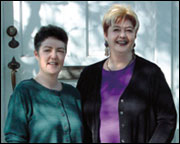Check Up: Connie Moore
Every month during our 10-year celebration, we revisit an individual we interviewed or who played a significant role in the issue published a decade ago. Ten years later, an attorney and her partner still strive to protect our families
By Thomas Blanton
Photo by Gavyn Aaron
 When Connie Moore and her partner Deborah Hunt (pictured, Moore on right) opened their lesbian/feminist law practice in the middle of the Montrose back in 1987, they found a significant lack of information regarding the legal rights of gay, lesbian, bisexual, and transgender persons.
When Connie Moore and her partner Deborah Hunt (pictured, Moore on right) opened their lesbian/feminist law practice in the middle of the Montrose back in 1987, they found a significant lack of information regarding the legal rights of gay, lesbian, bisexual, and transgender persons.
“One of our goals was to provide as much information as we could.” Moore says. She remembers that when OutSmart asked them to write a monthly legal column, “We jumped at the chance.”
Moore and Hunt’s “OutLaw” column—launched a decade ago this month with a Moore-written piece—brought in overwhelming feedback from both readers and those seeking legal counsel. Over the several years the column ran, the two lawyers (who penned columns in alternate months) utilized the opportunity to discuss a wide range of topics, everything from family law to landlord/tenant issues. “We covered a lot of ground,” Moore recalls.
Looking back over her 17 years of law practice, especially the last 10 years since she wrote that first column, Moore says that the community has become a group of more educated consumers when it comes to the law.
“Originally, we worked with people who assumed they would not be treated appropriately,” she explains. “Now, LGBT people have begun to feel as entitled to protection from our court system as anyone else.”
According to Moore, the types of legal issues facing the gay community have evolved significantly. For example, her first “OutLaw” column concerned co-parenting rights, because many LGBT people were beginning to plan families at that time. Now, many are opting for second-parent adoptions. However, not all relationships or family units are able to remain intact, and Moore now sees new problems looming.
“In the last few years, a number of LGBT couples have decided to have children, but decide not to stay together as a family,” she says. “It’s the same issues that heterosexual couples face, but there’s no easy vehicle for divorce, because there’s no marriage in the first place.”
One tactic Moore condemns in such cases is “playing the gay card,” or challenging the validity of an adoption by claiming that one’s former partner is an unfit parent because of his or her homosexuality.
“It’s people trying to use prejudice to rip apart something they were participating in willingly,” Moore says. “It’s incredibly destructive to the entire community. If you’re going to have kids and split up, do it nicely.”
In order to combat this reinforcement of prejudices, Moore and Hunt train their team of lawyers to “do no harm” and to vigorously represent their clients within the ethical confines of their own belief systems. Additionally, Moore and Hunt continue to work with families on an educational level. “Families are permanent,” Moore says. “If you want to leave the relationship, do so with both parents intact.”
As to significant changes and advances in the law that affect the gay community, Moore points out the U.S. Supreme Court’s striking down of anti-sodomy laws as well as the current legal and non-secular controversies surrounding gay marriage. “The issue is coming to a head,” she says, noting that she believes opponents of gay marriage are working against themselves by calling so much attention to the situation. “It has become such an issue because the religious right and other conservative groups have pushed it into the forefront.”
Additionally, Moore asserts that the loudest arguments against gay marriage are the same used in a 1967 court case involving interracial marriage. “If you were to read that case now and substitute homosexual for interracial, it would read as identical,” she says, adding, “There will be setbacks before it gets here, but gay marriage is on the horizon. This is a battle we will definitely win.”
Possibly the most noteworthy accomplishment of Moore and Hunt and their practice is that they have been able to consistently and successfully offer her services to the entire community for nearly two decades. “It’s 2004, and for us, nothing’s really changed,” Moore says. “We’re still here, doing the same things we’ve always done. That’s a good thing.”
Thomas Blanton also offers his take on queer eyes and straight guys in this issue.











Comments